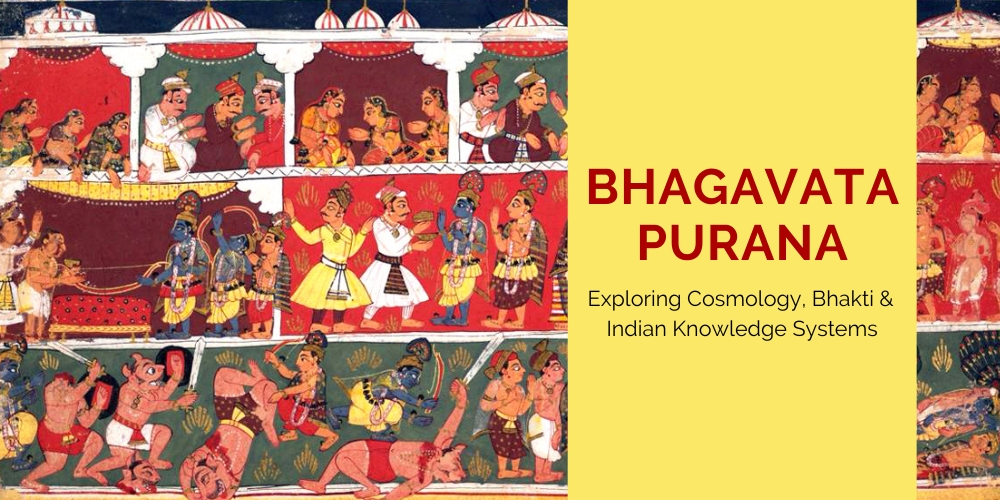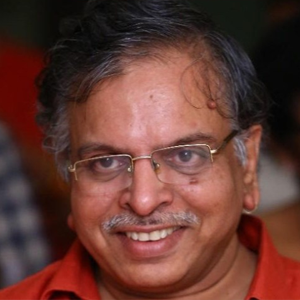
Bhagavata Purana Exploring Cosmology, Bhakti, and Indian Knowledge Systems
This course delves into the Bhagavata Purana, exploring its unique status as the “Ideal Purana.” Through eight in-depth modules, participants will gain insight into its conceptual framework, cosmology, portrayal of avatāras, its role in defining the tradition of Bhagavatas, and its significance in Indian knowledge systems. The course aims to provide a comprehensive understanding of how the Bhagavata Purana shaped Indian thought and the dynamics of Bhakti Rasa. Ideal for students and enthusiasts of Indian Knowledge Systems, this course will guide learners through a structured exploration of one of the most revered texts in Indian culture.
1 March 2025 - 5 July 2025
7:00 PM-8:00 PM IST
Every Saturday (Except on March 15 & 22, 2025)
Introduction
The Bhagavata Purana is celebrated as the “Ideal Purana,” epitomizing the essence of Purana literature. Its expansive narrative covers cosmology, theology, philosophy, and the Bhakti tradition, making it a vital source for understanding Indian religious and philosophical thought. This course introduces learners to the intricate layers of the Bhagavata Purana, examining its historical significance, conceptual framework, and the evolution of the Bhagavata tradition.
Unique Pedagogy : Two days immersive Experience in a Gurukulam
We have designed this learning experience not only to provide knowledge but also to help you embody it. After completing the online sessions, you will have the opportunity to participate in a unique, immersive experience at our INDICA-RITHAMBHARA Gurukulam in Bengaluru. Over two days (dates to be determined during the online sessions), you will perform a Homam with your fellow participants, engage with faculty members, listen to guest speakers, and fully embody the knowledge acquired. Please note that accommodation will be provided free of charge; however, participants will need to arrange their own travel.
Course Objectives
- To introduce the concept of the Purana and its various classifications
- To explore the philosophical significance of the Bhagavata Purana as the “Ideal Purana”
- To analyze the cosmological and avatāra concepts within the text
- To understand the Purana’s role in shaping the Bhakti tradition
- To study the social, environmental, and knowledge-based aspects of the Bhagavata Purana
Course Outcomes
By the end of the course, learners will:
- Gain a deep understanding of the Bhagavata Purana’s structure and themes
- Comprehend the philosophical underpinnings of Purana literature
- Be able to critically analyze the concept of avatāras in relation to cosmology
- Appreciate the Bhagavata Purana’s influence on the Bhakti movement and its cultural impact
- Understand the Purana’s contribution to various Indian Knowledge Systems
Course Syllabus
Module 1: Bhagavata Purana as the Ideal Purana
- Concept of Purana, Maha Purana, Ideal Purana
- Philosophical significance of the Ideal Purana
- Bhagavata Purana’s unique characteristics
- Concept of avatāras and its elucidation in the Bhagavata
- Avatāra-based divisions of the text
- Avatāra and Cosmology
Module 3: Bhagavata as Bhagavān
- Exploring the “avatāra vacuum” and the Purana’s origin
- Authorial identification and the empathy narrative
- Impact of narrative singing on spiritual vacuum filling
Module 4: Bhagavata as a Book about Bhagavatas
- Historical antiquity of the term “Bhagavata” and the Bhagvata tradition
- Evolution and spread of the Bhagavata tradition
- Bhagavata Purana as a text about Bhagavatas and the movement it represents
Module 5: Bhagavata as Rasa
- Vedakalpavriksha imagery: the juicy fruit of the Veda-tree
- Experiential ecstatic reading of the Bhagavata
- Bhagavata’s role in theorizing Bhakti Rasa
Module 6: The Bhagavata Purana as a Source of Indian Knowledge Systems
- Recognition of Bhagavata Cosmology in contemporary discourse
- Environmentalism in the Bhagavata
- Bhakti-centric social theory and its implications
Module 7: The Bhagavata Purana as Vedanta
- The concept of Puranas as Vedaartha Upabrimhana
- Trivarga Puranas and Moksha shaastra Purana , Bhagavata as Moksha Shaastra
- Bhagavata and the different schools of Vedanta
Module 8 : Bhagavata as a living Tradition
- Regional Indian language versions and variations of Bhagavata Purana
- Bhagavata variant narratives and Bhagavata based narratives and other folk and tribal lore
- Bhagavata deities and their worship traditions across India
Module 9 : Bhagavata as Shaastra
- Itihasas and Puranas as shaastras ,i.e., as academic disciplines; Bhagavata as an example
- Bhagavata as a Bhakti Shaastra for Vaishnava Bhakti traditions
- Shaastra features of Bhagavata Purana
Reading List
- Bhagavata Purana (select translations and editions)
Course Features
- Live Interactive Sessions: Participate in live lectures and discussions with ample opportunities for Q&A.
- Flexible Learning: Access class recordings and materials at your convenience for asynchronous learning.
- Certificate of Completion: Demonstrate your new knowledge with a certificate upon successfully completing the course.
*Important Enrollment Notice: Please note that this course requires a minimum of 15 registrations to commence. If the required number of students is not met, enrolled participants will be notified promptly and provided with options for a full refund or alternative courses.

